Clifford Garstang's Blog, page 124
August 11, 2011
KindleGraph This!
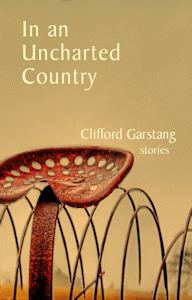 You can now request a "KindleGraph" for thousands of Kindle books, including mine. So, here's what I think you should do. Go to my website, which is here. Check out the blurbs and the description of the book, and then click on one of the buy options. Or you can just cut to the chase, and go directly to Amazon: In an Uncharted Country
You can now request a "KindleGraph" for thousands of Kindle books, including mine. So, here's what I think you should do. Go to my website, which is here. Check out the blurbs and the description of the book, and then click on one of the buy options. Or you can just cut to the chase, and go directly to Amazon: In an Uncharted Country .
.Then--or if you already have the book--go to KindleGraph and request that I sign your book.
Published on August 11, 2011 08:37
August 9, 2011
Fall for the Book Festival in the Washington DC metropolitan area - Fiction, Nonfiction, Poetry, and Live Events Free to the Public
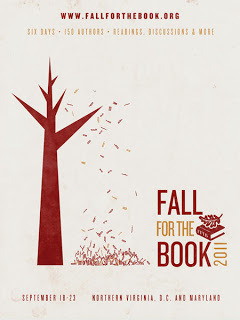 Fall for the Book Festival in the Washington DC metropolitan area - Fiction, Nonfiction, Poetry, and Live Events Free to the Public
Fall for the Book Festival in the Washington DC metropolitan area - Fiction, Nonfiction, Poetry, and Live Events Free to the PublicThe schedule for Fall for the Book is filling in nicely now. It's great to see who will be reading/presenting. I'm part of a group of four writers on a panel sponsored by the Northern Virginia Chapter of the Virginia Writers Club, at 3pm on Wednesday, Sept. 21, on the campus of George Mason University.
Check out the whole schedule and attend some of the events if you're in the area!
Published on August 09, 2011 18:37
The New Yorker: "Gilgul" by Yosef Hayim Yershalmi
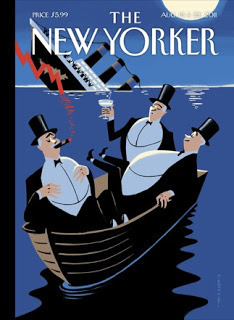 August 15, 2011: "Gilgul" by Yosef Hayim Yershalmi
August 15, 2011: "Gilgul" by Yosef Hayim YershalmiI liked this story well enough, although I'm not entirely sure what it was about.
Ravitch is a wanderer, who, while staying in Tel Aviv, goes with a friend to a "sorceress" in Jaffa. She offers mostly banalities, but also offers to tell Ravitch when he will die. (The offer is in the opening sentence, which makes for a very fine hook, you have to admit.) He declines and goes back to New York. Four years later—in the meantime he's published a book, gotten divorced, and his father has died—he is on vacation and returns to Tel Aviv. He's not sure why he's come—he doesn't contact his friends—but finally, after some brooding, he seeks out the sorceress. And she tells him a story about another restless man and his gilgul, which is, essentially, reincarnation.
She tells Ravitch that the story was meant for him, but is not about him, which sends the guy back to his hotel to have a drink and try to figure out why she told him the story. But he doesn't get it. (I don't either.)
Published on August 09, 2011 09:35
August 8, 2011
Review of Lost Memory of Skin by Russell Banks
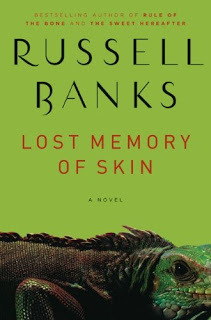 Lost Memory of SkinRussell BanksEcco, September 27, 2011
Lost Memory of SkinRussell BanksEcco, September 27, 2011As difficult as it is to have sympathy for this novel's main character—the Kid is a porn addict and convicted sex offender—it isn't at all difficult to become thoroughly caught up in the memorable story that revolves around him. After all, there's talk of pirates and buried treasure, there's a hurricane, there's a secret agent (or double agent), and there's an adventure in a Florida swamp. What's not to like? Along the way, there's a discourse on knowledge and truth, on believing and knowing, and on the reinvention of self.
As with Banks's previous work, this book takes some inspiration from another great work of literature. The Rule of the Bone borrowed from The Adventures of Tom Sawyer. Cloudsplitter bears some resemblance to Moby Dick. Banks had Shakespeare's The Tempest in mind for The Darling. And here there are numerous echoes of The Adventures of Huckleberry Finn, including a less-than-admirable protagonist, a drowned father-figure, life on a river, and the ultimate determination to make a go of an independent, better life.
Let's get the crime over with first. The Kid—whose problems all seem to stem from having a lousy mother, naturally—was convicted of soliciting sex with a minor. He didn't actually have sex with her, but he certainly had reason to know she was only 14, and he certainly intended to commit the act (having arrived at her home with condoms, lube, and a porn DVD). There's no attempt either on Banks's part or the Kid's to defend his conviction as entrapment or a legal mistake, and the Kid knows that what he did was stupid. As a result of the conviction, after serving time in jail, he's on parole for 10 years, wearing an ankle-trace, and must stay away from children and any place where children might congregate. Which in the Florida county where he lives, because of the distribution of schools and parks, means one of only three places: at the airport, in the swamp, or under the Causeway. So he's living in a tent under the Causeway with a bunch of other sex offenders, along with the Kid's pet iguana, Iggy, in a settlement of homeless sex offenders. A police raid of the camp sets all the residents in motion, including the Kid.
At about the same time, the Kid meets "the Professor," another extraordinary character who isn't exactly likeable. He's huge—tall, morbidly obese, bearded—and is a sociologist who studies homelessness. While the Kid's story is fairly straightforward, albeit repulsive, the Professor's is more convoluted. He is a certified genius who may or may not have deep dark secrets—he recalls a time when he was a government informant planted in student radical groups—and the reader, like the Kid, spends most of the book wondering what his motives might be for helping the Kid out.
While the Kid is too simple to lie, at least for very long (late in the book he admits that he's glad the truth has come out about him because he has a hard time keeping track of the lies), the Professor is as unreliable as they come. He says he is who he says he is—now—but at the same time he reveals his undercover and deceptive past to the Kid, a confession that puts in doubt everything he claims to be true. In the end, the Kid concludes that the truth isn't as important as what you choose to believe.
Amusingly, he reaches this conclusion with the help of a late-arriving character called the Writer. At that moment, the Kid is living on a houseboat in the swamp, but when he sees the Writer in the local store he realizes the man looks like someone he recognizes: "Now that the Kid notices him he thinks the guy looks like the famous writer Ernest Hemingway whose books the Kid has never read of course but he's seen his picture in magazines and on TV even though he's pretty sure the writer's been dead for a long time." What's amusing about this is that Banks himself bears a resemblance to Hemingway, and so it's not hard to imagine that he's written himself into the end of the book as a way of bringing the story to its close.
The book is also, in some sense, about lost innocence. Despite his felony conviction, the Kid is technically a virgin. Early in the book he acquires a Bible, which he begins reading for lack of anything to take its place, and learns again the story of the Garden of Eden, Adam and Eve, and the snake. At the book's end, he's been to the garden—the swamp—and he's seen the snake—an enormous Burmese python. And it's not someplace he wants to stay.
While Lost Memory of Skin won't appeal to some readers because of its subject matter, it's a solid, compelling novel that is every bit as morally complex as Banks's previous books, including Cloudsplitter, the deeply conflicted story of the abolitionist John Brown. And it is because of the subject matter, and the remarkable characters Banks has created, that this book might be his most memorable.
Published on August 08, 2011 06:57
August 3, 2011
Writing Seminars: Get Your Short Story or Essay Published
 On September 17, from 9am to 1pm, I'll be leading a seminar at WriterHouse in Charlottesville, VA on the process of getting short fiction and non-fiction published--everything from polishing your manuscript to conducting market research, to drafting your cover letter, to negotiating your contract! The seminar is open to non-members, although members get a discount (not to mention access to all kinds of other great programs and benefits).
On September 17, from 9am to 1pm, I'll be leading a seminar at WriterHouse in Charlottesville, VA on the process of getting short fiction and non-fiction published--everything from polishing your manuscript to conducting market research, to drafting your cover letter, to negotiating your contract! The seminar is open to non-members, although members get a discount (not to mention access to all kinds of other great programs and benefits). Take a look at the course offerings and consider joining us on the 17th of September.
Writing Seminars
Published on August 03, 2011 19:47
Write-Brained Network -- Workshop on September 10, 2011
 The Write-Brained Network is a writing organization based in the Shenandoah Valley (but with a national membership). And they are putting together a workshop on Saturday, September 10, at the Court Square Theater in Harrisonburg that looks like it's going to be excellent. And I'm not just saying that because I'm going to be one of the panelists. (Okay, maybe I am, but it's still going to be excellent.)
The Write-Brained Network is a writing organization based in the Shenandoah Valley (but with a national membership). And they are putting together a workshop on Saturday, September 10, at the Court Square Theater in Harrisonburg that looks like it's going to be excellent. And I'm not just saying that because I'm going to be one of the panelists. (Okay, maybe I am, but it's still going to be excellent.)Check out the details here: One Stop Workshop for Serious Writers. It's all day, and VERY reasonably priced (only $45 if you sign up before 9/3) and features lots of great presentations. I hope to see you there.
Published on August 03, 2011 08:25
August 2, 2011
Prime Number Magazine Update 11.2
 photo by Cath BartonThe latest update to Prime Number Magazine is now live, with fiction by Andrew Stancek and Theresa Williams, and poetry by Richard Krawiec, Kate Partridge, and Elizabeth Savage. I think you'll enjoy it.
photo by Cath BartonThe latest update to Prime Number Magazine is now live, with fiction by Andrew Stancek and Theresa Williams, and poetry by Richard Krawiec, Kate Partridge, and Elizabeth Savage. I think you'll enjoy it.
Published on August 02, 2011 19:15
The New Yorker: "What Have You Done?" by Ben Marcus
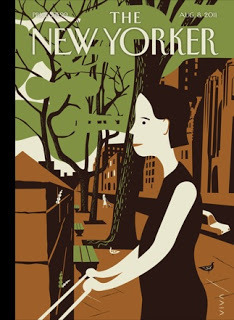
August 8, 2011: "What Have You Done?" by Ben Marcus
This story is a little sneaky. Paul is the point of view character/protagonist, and this is his voice, although the story is told in third person. He knows something that he's not telling us, the readers, because he's also not telling the other people in the story—his parents and his sister and brother-in-law. On the other hand, his concealing his secret (I guess I shouldn't reveal it either?) is the point.
Paul has returned to his hometown of Cleveland, where he hasn't been for some time. But there's a family reunion, and so here he is. He's met at the airport—at this point, the reader wonders if there's some family tragedy that has occurred that brings him home—by his father, his sister, and the brother-in-law. Everyone except his mother. Paul thinks everyone is uncomfortable with him. (They are. And there's a reason for that, too.)
But Paul is doing okay for himself, although when he tries to explain this to the family no one believes him. Which, naturally, frustrates him. His tendency to become nasty emerges. But at the family reunion, he mostly behaves himself, and even has a good time, although being back in Cleveland brings out the worst in him. Until he realizes this and he has to leave early and go home. To his home, not his parents home. Which is when the climactic scene with the mother happens.I enjoyed the story a lot, because the character of Paul is so flawed and neurotic. With such characters, everything they do is a surprise, and Paul is no exception. And what's it all about? Coming home, for one thing. Paul's perceptions of what Cleveland is are colored by the presence of his family, in which he no longer fits. It's also about building—Paul's father was a contractor, Paul a woodworker who notices architecture—and about creating the future. But it's also a great portrait of Paul, who is fat, seems sexually immature, and has some anger management issues.
Check out the interview with Ben Marcus, too, that sheds additional light on the story.
Published on August 02, 2011 14:15
Writers.com: Writing the Short Story
 The internet is perfect for online writing courses. One that I teach-- Writing the Short Story: Make Your Story Great! kicks off again on September 6. We always have a lot of fun in this class. Not only do we take another look at the fundamentals of fiction--every writer sees this differently--but we also read and discuss some classic short stories and do some writing exercises that illustrate the point under discussion. And, on top of that, we critique stories submitted by the participants. There's a lot packed into this 10-week course. Start date is September 6. Sign-up now to secure a place in the class.
The internet is perfect for online writing courses. One that I teach-- Writing the Short Story: Make Your Story Great! kicks off again on September 6. We always have a lot of fun in this class. Not only do we take another look at the fundamentals of fiction--every writer sees this differently--but we also read and discuss some classic short stories and do some writing exercises that illustrate the point under discussion. And, on top of that, we critique stories submitted by the participants. There's a lot packed into this 10-week course. Start date is September 6. Sign-up now to secure a place in the class.
Published on August 02, 2011 12:24
What Does Fiction Know? Richard Powers on Postmodern Berlin: Places: Design Observer
 Richard Powers kicks off a special feature in Design Observer on place in fiction, which will run throughout August. As a departure from their usual analysis and critique, they'll be featuring short stories and novel excerpts in which place is central to mood and meaning. They have work lined up from some of the very best contemporary writers of place: Urban Waite, Emily Mitchell, Barry Lopez, Anthony Doerr, Ashleigh Pedersen, Ryan Harty and Danielle Dutton. (Look for two stories a week from Aug. 8 to Aug. 29.)
Richard Powers kicks off a special feature in Design Observer on place in fiction, which will run throughout August. As a departure from their usual analysis and critique, they'll be featuring short stories and novel excerpts in which place is central to mood and meaning. They have work lined up from some of the very best contemporary writers of place: Urban Waite, Emily Mitchell, Barry Lopez, Anthony Doerr, Ashleigh Pedersen, Ryan Harty and Danielle Dutton. (Look for two stories a week from Aug. 8 to Aug. 29.)What Does Fiction Know? Richard Powers on Postmodern Berlin: Places: Design Observer
Published on August 02, 2011 08:42



